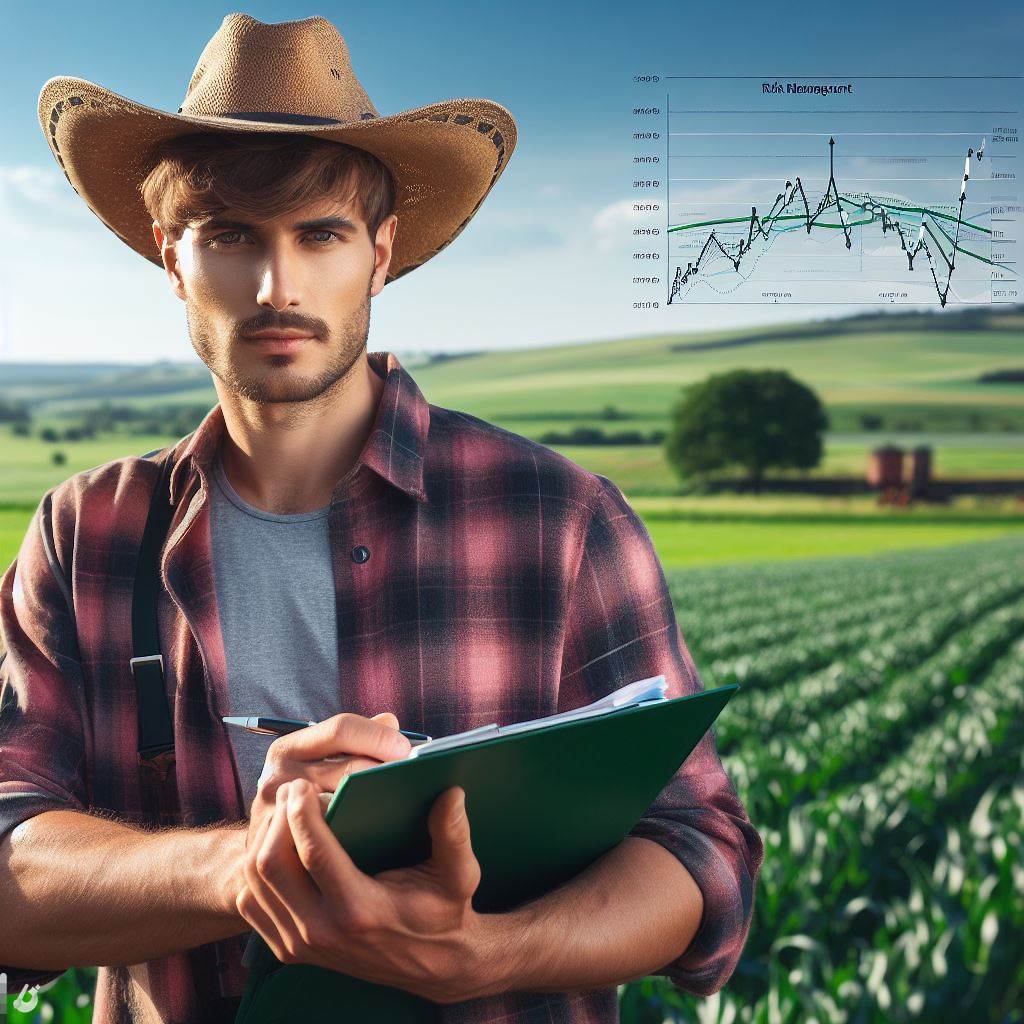Introduction
Agri-Tech refers to the use of technology in agriculture to enhance productivity and efficiency.
Technology plays a crucial role in agriculture by enabling farmers to optimize their operations and meet increasing food demands.
Advancements in Agri-Tech have revolutionized farming practices, allowing farmers to embrace new methods and techniques to maximize their yields.
Agri-Tech tools and equipment help farmers in enhancing the overall productivity of their crops and livestock.
Technology enables farmers to optimize the use of resources such as water, fertilizers, and energy.
Agri-Tech provides real-time data on crop health, enabling farmers to detect diseases and pests early on and take appropriate measures.
With the help of drones and satellite imaging, farmers can precisely monitor their fields, allowing them to target specific areas for interventions.
Agri-tech promotes sustainable farming practices by reducing the use of chemicals, water, and energy, thereby reducing environmental degradation.
Implementing Agri-Tech solutions can be costly, which may act as a barrier for small-scale farmers.
Rural areas often lack reliable internet connectivity and access to the necessary technological infrastructure.
The future of agri-tech looks promising, with innovations like automated machinery, artificial intelligence, and internet of things (IoT) being integrated into agricultural practices.
Governments, technology companies, and farmers need to collaborate to overcome challenges and ensure widespread adoption of Agri-Tech.
Agri-Tech has made significant contributions to the agriculture sector, revolutionizing farming practices and making them more efficient and sustainable.
Despite the challenges, the future of Agri-Tech holds immense potential for further advancements and increased adoption, benefiting both farmers and consumers.
Embracing technology is essential for the development of a resilient and productive agricultural industry.
Transform Your Agribusiness
Unlock your farm's potential with expert advice tailored to your needs. Get actionable steps that drive real results.
Get StartedHistory of Agri-Tech
Early Developments in Agricultural Technology
Before the advent of modern technology, ancient civilizations practiced primitive forms of agriculture.
They relied on manual labor and basic tools to cultivate the land and grow crops.
- Hand Tools: Early farmers used simple hand tools, such as hoes, sickles, and plows, to till the soil and prepare it for planting. These tools required physical strength and were time-consuming.
- Irrigation Systems: Ancient civilizations like the Egyptians developed rudimentary irrigation systems to control and distribute water to their crops. These systems involved digging canals or diverting rivers to ensure steady water supply.
- Crop Rotation: Farmers understood the importance of crop rotation, a practice where different crops are grown in succession on the same piece of land. This helped to maintain soil fertility and control pests and diseases.
Industrial Revolution and Mechanization
The Industrial Revolution, spanning from the 18th to the 19th century, brought significant advancements in agricultural technology.
- Steam Power: The invention of steam-powered machinery, such as the steam engine, revolutionized agriculture. Farmers could now use steam-powered tractors to plow fields, increasing productivity and efficiency.
- Mechanical Reapers: Cyrus McCormick’s invention of the mechanical reaper in the 1830s allowed for mechanized harvesting. This device enabled farmers to harvest crops much faster than manual labor.
- Chemical Fertilizers: Industrialization also led to the development and mass-production of chemical fertilizers. This allowed farmers to replenish soil nutrients and increase crop yields.
Green Revolution and Improved Crop Yield
The mid-20th century saw another significant leap in agricultural technology known as the Green Revolution.
This revolution aimed to increase global food production.
- High-Yielding Varieties: Scientists developed high-yielding crop varieties through cross-breeding and genetic modification. These new varieties produced more grains per plant, thus increasing overall crop yield.
- Synthetic Pesticides: Chemical pesticides were introduced to combat pests and diseases that threaten crop growth. This helped protect crops from extensive damage and further increased productivity.
- Precision Farming: Technological advancements in the late 20th century allowed for precision farming techniques. Farmers began using GPS, drones, and sensors to monitor crops, optimize irrigation, and apply fertilizers precisely.
In brief, the history of agri-tech demonstrates the continuous advancement of agricultural technology throughout the centuries.
From the early use of simple hand tools to the modern era of precision farming, each development has contributed to improving crop yield and overall efficiency in farming.
The future of agri-tech holds even more promise, as scientists and researchers work towards sustainable and innovative solutions for the ever-growing global agricultural industry.
Current applications of agri-tech
Precision agriculture and data-driven farming
Precision agriculture utilizes modern technologies to optimize crop production and maximize yields.
It involves the use of sensors to monitor soil moisture levels, temperature, and nutrient content.
Farmers can make informed decisions about irrigation and fertilization, reducing wastage and improving efficiency.
Data-driven farming integrates real-time data analysis for better decision-making and resource allocation.
This technology enables farmers to detect early signs of plant diseases or pest infestations, preventing crop loss.
Furthermore, it helps in determining optimal planting and harvesting times, enhancing productivity.
Use of drones and satellite imagery
Drones equipped with cameras are used in agriculture to capture aerial images for monitoring crop health.
These images can provide valuable insights into crop growth, nutrient deficiencies, and irrigation needs.
Satellite imagery is also utilized to assess large tracts of land, identifying variations in plant health and soil conditions.
The data collected through drones and satellites aid farmers in making targeted interventions for improved yields.
Additionally, drones can be employed to distribute seeds, spray pesticides, and assess infrastructure conditions on farms.
Automation in farming practices
Automation has revolutionized farming, minimizing human effort and increasing productivity.
Robotic systems can perform tasks such as planting, harvesting, and weeding with higher precision and efficiency.
These technologies reduce labor costs and help farmers overcome challenges related to labor scarcity.
Automated irrigation systems accurately deliver water based on crop needs, conserving water resources.
Moreover, smart tractors equipped with GPS technology enable precise seed planting and fertilizer application.
Showcase Your Farming Business
Publish your professional farming services profile on our blog for a one-time fee of $200 and reach a dedicated audience of farmers and agribusiness owners.
Publish Your ProfileGenetic engineering and biotechnology
Genetic engineering plays a crucial role in developing crops with desired traits, enhancing their resistance to pests and diseases.
Biotechnology enables the production of genetically modified organisms (GMOs) that have improved nutritional profiles.
Through biotechnology, crops can be made more adaptable to harsh environmental conditions, ensuring food security.
Genetic engineering also facilitates the efficient production of biofuels, reducing dependency on fossil fuels.
Biotechnology contributes to the development of sustainable agriculture by improving crop productivity and reducing waste.
In general, the current applications of agri-tech have transformed farming practices across various aspects.
Precision agriculture and data-driven farming enable farmers to optimize resource utilization and make informed decisions.
The use of drones and satellite imagery provides valuable insights into crop health and aids in targeted interventions.
Automation in farming practices reduces labor costs and increases productivity, while genetic engineering and biotechnology enhance crop traits, nutritional profiles, and environmental adaptability.
Agri-tech continues to revolutionize the agricultural industry, contributing to sustainable and efficient farming practices.
Read: Global Market Trends for Farmers
Benefits of agri-tech
Modern agricultural technology, also known as agri-tech, has revolutionized farming practices and brought about numerous benefits.
This section will discuss some of the most significant advantages of adopting agri-tech.
Increased productivity and efficiency
By leveraging cutting-edge technologies, farmers can optimize their operations and achieve higher levels of productivity.
The use of automated machinery and smart monitoring systems enables accurate and timely completion of tasks, reducing human error and labor requirements.
Improved crop yield and food production
Agri-tech offers farmers innovative solutions to enhance crop productivity.
Advanced techniques such as precision farming, genetic engineering, and controlled environment agriculture enable farmers to cultivate crops with higher yields, improve their quality, and make them more resistant to diseases and pests.
Reduction in resource usage (water, pesticides, etc.)
One of the key benefits of agri-tech is its ability to minimize resource consumption.
Smart irrigation systems allow farmers to precisely water their crops, reducing water wastage.
Additionally, the use of integrated pest management systems helps minimize pesticide application while effectively controlling pests, ensuring the overall health of crops and the environment.
Enhanced sustainability and conservation
Agri-tech promotes sustainable farming practices by minimizing environmental impacts.
It enables farmers to adopt eco-friendly techniques such as organic farming, vertical farming, and hydroponics.
These methods reduce land usage, greenhouse gas emissions, and chemical pollutants, contributing to overall environmental conservation.
Agri-tech’s benefits are not limited to farmers alone; they extend to consumers, industries, and the environment.
For consumers, agri-tech means access to a consistent and reliable supply of high-quality produce.
The improved crop yields and efficient distribution networks result in a more affordable and diverse range of food options.
Agri-tech also helps meet the ever-increasing food demand of a growing global population, ensuring food security for all.
Industries dependent on agricultural products also benefit greatly from agri-tech.
With a constant and abundant supply of raw materials, industries such as food processing, textile, and healthcare can plan their operations more efficiently.
This leads to economic growth, job creation, and technological advancements in ancillary sectors.
Lastly, agri-tech plays a vital role in environmental sustainability and conservation.
By reducing resource usage and minimizing the environmental impact of farming activities, it helps preserve the ecological balance and biodiversity.
The adoption of agri-tech can help combat climate change, protect natural resources, and prevent soil degradation.
In a nutshell, agri-tech brings forth numerous benefits that promote efficient, sustainable, and productive farming.
Increased productivity, improved crop yield, reduced resource consumption, and enhanced sustainability are just a few advantages that highlight the significance of agri-tech in revolutionizing farming practices.
By embracing these technologies, farmers can pave the way for a brighter future for agriculture and the planet as a whole.
Read: Navigating Finance in Agribusiness

Challenges and Limitations of Agri-Tech
Cost and Accessibility
- Agri-tech can be expensive, making it inaccessible for small-scale farmers.
- High costs of equipment, technology, and maintenance may prevent widespread adoption of agri-tech.
- Limited access to financing and lack of technical expertise further hinder farmers from embracing agri-tech.
Resistance from Traditional Farmers
- Traditional farmers may resist agri-tech due to a lack of awareness and understanding.
- They might fear job displacement and the loss of traditional farming methods.
- Lack of trust in new technologies and skepticism about their effectiveness can create resistance.
Ethical Concerns and GMO Debate
- Agri-tech includes genetically modified organisms (GMOs), which raise ethical concerns and spark debate.
- Some consumers and farmers worry about the long-term consequences of GMOs on human health and the environment.
- The use of GMOs in agriculture creates controversies regarding patenting, ownership, and control over seeds.
Environmental Impacts and Potential Risks
- Agri-Tech can have unintended environmental consequences, such as increased chemical usage and pollution.
- Excessive reliance on Agri-Tech may lead to the loss of biodiversity and harm beneficial organisms like bees.
- The potential risks of Agri-Tech, including genetic contamination and unintended gene transfer, require careful regulation and monitoring.
Despite its potential to revolutionize farming, Agri-Tech faces several challenges and limitations.
The high costs and limited accessibility hinder small-scale farmers from adopting these technologies.
Showcase Your Farming Business
Publish your professional farming services profile on our blog for a one-time fee of $200 and reach a dedicated audience of farmers and agribusiness owners.
Publish Your ProfileResistance from traditional farmers highlights the need for education and awareness programs to overcome skepticism.
Ethical concerns surrounding GMOs and the ongoing debate necessitate thoughtful consideration and regulation.
Additionally, the environmental impacts and potential risks call for responsible implementation and monitoring.
As technology advances and concerns are addressed, Agri-Tech can contribute significantly to the sustainability and productivity of the global agriculture sector.
Read: Farming in the Digital Age
Future prospects of Agri-Tech
Integration of artificial intelligence and machine learning
The future of Agri-Tech lies in the seamless integration of artificial intelligence and machine learning technologies.
These advancements can help farmers make informed decisions based on real-time data.
With AI and machine learning algorithms, farmers can analyze historical data, weather patterns, and soil conditions to optimize crop production.
Moreover, AI-powered drones and robots can perform tasks like monitoring crop health, applying fertilizers, and detecting pests, ultimately improving efficiency and reducing human labor.
Vertical farming and urban agriculture
The growing population and limited arable land make vertical farming and urban agriculture crucial for future food production.
Vertical farming allows crops to be grown in stacked layers vertically, utilizing space more efficiently.
It also reduces water consumption and minimizes the impact of extreme weather conditions.
Urban agriculture brings the farm closer to the consumers, using innovative techniques like hydroponics and aquaponics.
This not only reduces transportation costs but also provides fresh and nutritious produce to urban areas.
Bioinformatics and personalized farming solutions
Bioinformatics, the use of computer science and biology, offers personalized farming solutions tailored to specific crops and regions.
By analyzing genetic data and environmental conditions, bioinformatics can optimize crop performance, disease resistance, and yield potential.
It enables farmers to select the most suitable seed varieties and utilize resources efficiently.
Farmers can also leverage bioinformatics to predict and prevent outbreaks of plant diseases, ensuring higher crop quality and reducing pesticide usage.
Role of Agri-Tech in addressing global food security
Agri-Tech plays a crucial role in addressing global food security challenges in several ways.
Firstly, technology-driven solutions enable increased crop productivity and yield. This is essential to meet the rising demand for food due to population growth.
Secondly, Agri-Tech allows farmers to practice sustainable agriculture by reducing the use of water, fertilizers, and pesticides. This helps preserve natural resources and protect the environment.
Thirdly, Agri-Tech enables smart farming practices, ensuring efficient resource allocation and reducing food waste throughout the supply chain.
In summary, the future of Agri-Tech holds immense potential for revolutionizing farming practices.
Integration of artificial intelligence and machine learning, vertical farming and urban agriculture, bioinformatics, and personalized farming solutions, along with addressing global food security, will shape the agricultural landscape in the coming years.
Read: Effective Marketing for Modern Farmers
Conclusion
Agri-Tech has revolutionized farming by increasing productivity, improving efficiency, and reducing environmental impact.
Farmers have access to advanced tools and technologies, such as precision agriculture, drones, and smart sensors, which have transformed traditional farming practices.
These innovations have allowed farmers to optimize crop production, minimize water and fertilizer usage, and effectively manage pests and diseases.
Agri-Tech has also brought automation to farming operations, reducing labor costs and improving overall farm management.
With the increasing global population and rising demand for food, the importance of continued innovation and research in Agri-Tech cannot be overstated.
It is crucial to develop new technologies that can further enhance agricultural practices and address challenges like climate change, limited resources, and food security.
Farmers need access to cutting-edge solutions that can help them adapt to changing environmental conditions and ensure sustainable food production.
Through ongoing research and innovation, Agri-Tech can continue to evolve and stay ahead of emerging challenges, enabling farmers to overcome obstacles and meet the demands of a rapidly growing population.
The future of farming with agri-tech looks promising.
As technology continues to advance, it holds immense potential to transform agriculture, making it more efficient, profitable, and sustainable.
Farmers can expect to see further automation, adoption of artificial intelligence, and integration of big data analytics into their operations.
However, it is essential to ensure that the benefits of Agri-Tech reach all farmers, including small-scale and resource-constrained farmers.
Governments, organizations, and researchers need to work together to bridge the digital divide and provide access to affordable and user-friendly Agri-Tech solutions to farmers worldwide.
Agri-Tech has already revolutionized farming, but its journey is far from over.
Continued innovation, research, and inclusive adoption of Agri-Tech can pave the way for a future where farming becomes more sustainable, productive, and resilient, ensuring food security for generations to come.
Showcase Your Farming Business
Publish your professional farming services profile on our blog for a one-time fee of $200 and reach a dedicated audience of farmers and agribusiness owners.
Publish Your Profile



